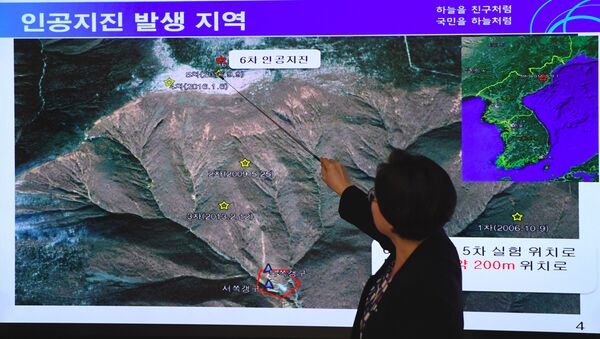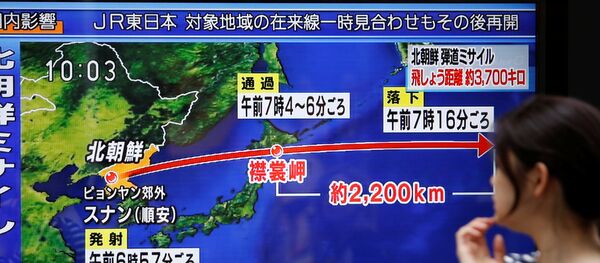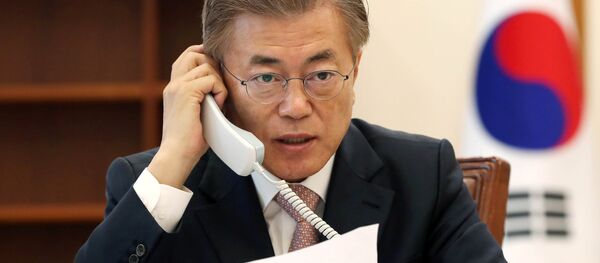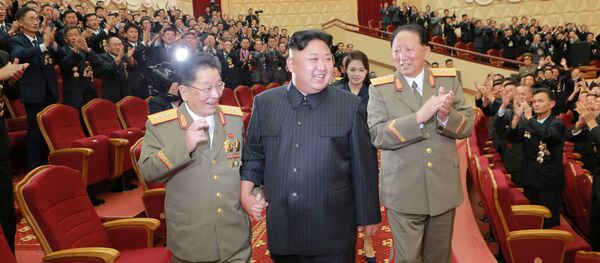MOSCOW (Sputnik), Tommy Yang — Despite growing difficulties the international community faces in attempting to convince North Korea to give up its nuclear arms program, the basic principle of nuclear non-proliferation pushes major global actors, including Russia, China and the United States, to continue calling for the denuclearization of the Korean Peninsula, experts told Sputnik.
After the United Nations Security Council (UNSC) voted unanimously in support of tougher sanctions against North Korea on Monday, Pyongyang sounded as defiant as ever in its response to these measures. North Korean Foreign Ministry went called the sanctions "illegal and evil", which only served to verify that the road Pyongyang chose to go down was absolutely right and strengthen the country's resolve to continue this path at a faster pace without the slightest diversion until the fight to the finish is over, the official Korean Central News Agency (KCNA) reported.
North Korean Ambassador to Russia Kim Hyun Joon said on Tuesday that Pyongyang was ready to respond to the new UNSC sanctions. "We are ready to use any, including the most recent means," the ambassador said at a press conference in Moscow.
Against Nuclear Non-Proliferation Principal
Facing a determined North Korea, which successfully tested its most powerful nuclear bomb and claimed it could be used in an intercontinental ballistic missile (ICBM) earlier this month, the international community has continued to call on Pyongyang to give up its nuclear arms program while refusing to accept the country as a nuclear power.
The international community’s reluctance to accept North Korea’s nuclear capabilities may come from the basic principal of nuclear non-proliferation, experts told Sputnik.
"We do face the reality of not being able to find a solution [to convince North Korea to denuclearize]. No country can solve this problem. But to continue to call for denuclearization on the Korean Peninsula, this is a principal all the nations have to hold onto. Nuclear non-proliferation is an international principal. No country wants to openly make a concession. No country wants to be the first to officially accept and recognize North Korea’s nuclear capabilities," Zhao Tong, a fellow in Carnegie’s Nuclear Policy Program at the Carnegie–Tsinghua Center for Global Policy in Beijing, told Sputnik.
According to the Beijing-based expert, some policy makers in both China and Russia still hold the illusion that North Korea could be convinced to give up its nuclear program after different nations improve its relations with Pyongyang and provide security guarantee to the isolated country as friendly allies.
"They often cite previous examples of how countries like South Africa, Ukraine, Belarus and Kazakhstan gave up their nuclear weapons voluntarily. They foolishly think it’s possible to convince North Korea. It just shows their lack of understanding of nuclear non-proliferation history and the support of the nuclear program from inside North Korea," Zhao said.
Weakened Sanctions
The latest UNSC sanctions introduced a ban on the country's textile exports and a cap on crude oil imports, while also forbidding imports of all condensates and natural gas liquids. But compared to the initial draft resolution proposed by the United States, the final UNSC resolution removed tougher restrictions such as a complete oil embargo and deportation of North Korean workers overseas.
Experts told Sputnik that Russia’s position regarding to North Korea may have something to do with its hostile standoff against the United States.
"I believe Russia has its own concerns. By making sure North Korea does not suffer severe economic blows, the nuclear crisis on the Korean Peninsula could continue for a prolonged period of time. This could be a kind of containment against the United States, as Russia-US relations deteriorated dramatically after the Crimea crisis," Zhang Liangui, an expert on North Korea at the Central Party School, which trains Chinese officials in Beijing, told Sputnik.
The Chinese expert believes Russia is trying to take advantage of the nuclear crisis on the Korean Peninsula to assert its influence in Northeast Asia.
Russian President Vladimir Putin said at the Eastern Economic Forum earlier this month that North Korea will not abandon the development of nuclear weapons under the pressure of sanctions.
The Beijing-based scholar suggested that provoking North Korea further would be a sign that the latest UNSC sanctions indeed inflicted pain on Pyongyang.
"If the UNSC sanctions have an impact, North Korea could go crazy as it claims and take provocative actions that lead to further escalation of tension," Zhang said.
Not Right Time For Dialogue
Russian Deputy Foreign Minister Sergey Ryabkov told Sputnik on Wednesday that Russia, together with China, plans to offer certain models of settlement that could include dialogue and political process. UN Secretary-General Antonio Guterres said he would welcome Russia's role in restarting the dialogue between North and South Korea, while adding that he intended to involve his predecessor, Ban Ki-moon, a South Korean diplomat. in the settlement of the North Korea situation.
"The overall environment is not ripe for a dialogue. After North Korea’s sixth nuclear test, South Korea’s attitude has changed. Before the latest test, no matter what kind of provocation from Pyongyang, Seoul always expressed interests in dialogue. But after recent nuclear test, it was a heavy blow to South Korea, which always viewed the nuclear test as a psychological ‘red line’," he said.
The expert noted that after the latest nuclear test, South Korean authorities said that now is the time to punish North Korea, not hold dialogues.






